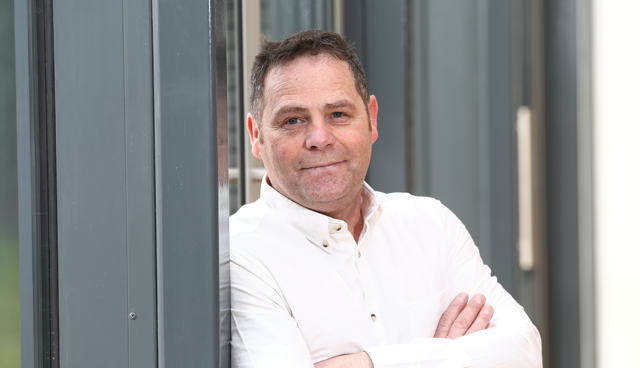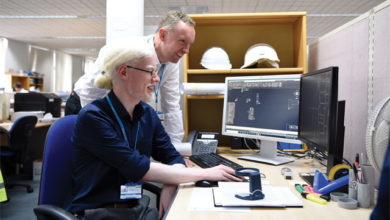Workplace wellbeing

Positive mental health and suicide intervention/prevention trainer Philip McTaggart discusses the importance of workplace wellbeing, the value of support structures and the challenges of greater diversity.
What is workplace wellbeing and why is it important?
Workplace wellbeing comes in many forms and it’s important that we break down the stigma that discussions about mental health are not suitable for the workplace. Recent evidence suggests that one in five employees have called in sick due to stress but 90 per cent of these have not felt able to tell their boss the real reason. In 2017, almost two people took their own lives on the island of Ireland everyday (392 in Republic of Ireland and 305 in Northern Ireland). We need to be building a support culture and introducing preventions that change these statistics.
The workplace is representative of society and the workplace has a massive influence on the mental health of society at large. The main cause of poor mental health is stress and it’s important to understand that poor mental health can impact us all. Stress can be caused through the job, but it can also be personal stress like individual finance, a bereavement or a relationship breakdown. Positive workplace wellbeing is advantageous for public services such as health, for the worker, in terms of self-importance and for the employer in terms of productivity. Valued and supported staff are far more likely to deliver the best outcomes for your business.
Northern Ireland is becoming a more diverse society and that evolution brings both challenges and opportunities. What are the mental health impacts of exclusion?
Again, exclusion can take many forms and it’s something that needs to be combatted from the top down. Ethnic diversity can bring about exclusion but so too can being overlooked for promotion, left out of social outings or even desk arrangement. Creating an inclusive environment is a key ingredient to staff wellbeing and as well as productivity, has wider benefits in the form of attraction and retention. On a personal level, support groups, mentoring programmes or a functional complaints procedure can be very beneficial to an individual’s mental health. Inclusion in the workplace is a major factor in performance and loyalty.
How can workplaces ensure that they are inclusive and better equipped to promote wellbeing?
Equipping staff with the right tools is very important. Organisations and businesses are recognising the requirement to input strategies around mental health, wellbeing and diversity but this must not be a tick box exercise. Any strategy has to be fully-integrated and often this means group responsibility. Identifying and providing training to mentors within the workplace is vitally important. Staff being able to identify someone that they can speak to on an individual basis about their concerns or support needs is highly beneficial. Of the 90 per cent of people who felt they could not tell their manager the real mental health reason for their absence, 50 per cent said that they would be less likely to take time off if they felt supported by their employer.
A key to inclusivity is making staff feel valued and this in turn promotes better wellbeing. Support groups, incentive days and staff recognition are all tools for creating better workplaces and better workplace wellbeing.
Why should workplaces make sure that an individual’s wellbeing is also their problem?
The Organisation for Economic Co-operation and Development (OECD) estimates that ‘mental ill-health is the biggest single cause of sickness absence and health related productivity losses in UK organisations, estimated at a cost of £70 billion per year’ (January 2014). In Northern Ireland it is estimated that mental ill-health costs the economy approximately £4 billion every year.
Positive workplace wellbeing is advantageous for public services such as health, for the worker, in terms of self-importance and for the employer in terms of productivity.
Investing in people can have multiple benefits for organisations in the form of increased productivity and motivation, reduced absenteeism, lower staff turnover and increased staff loyalty. An additional advantage, that is often overlooked, is that in supporting someone to come back to work, when they are ready, you are gaining another mental health champion. Often such a person will be better equipped to identify signs in colleagues, will provide better feedback on the necessary supports and be more tuned in to the organisation’s wellbeing reach.
What are some of the barriers to people seeking support?
The biggest barrier is often the stigma around mental health and people feeling uncomfortable talking about their mental health in the workplace for fear of being labelled. In worst case scenarios people fear for the security of their job or for being overlooked for promotion if they admit to needing support. Again, mental health is often stress-related and the workplace can be a large source of stress. To that end, we must develop supports within the workplace to help individuals.
However, given the stigma, those suffering from poor mental health are often hesitant to talk about it and more likely to cover up their problems. Equipping staff to recognise signs in a colleague and know how to signpost for support can make a real difference. Everyone’s needs are different, so a multi-channel approach is desirable. This could deviate from a colleague or manager asking ‘are you okay?’ on a one-to-one basis or getting an individual more professional support if they agree it is needed. Staff being able to identify who they can talk to in a safe, secure and private environment is important.
How can you identify that someone might be suffering from poor mental wellbeing
Poor mental health can be hard to identify in a busy world and busy workplace when everyone has a focus on themselves. The signs won’t always be obvious given that we as a society have a tendency to mask our personal problems and put on a brave face. However, when you look closely, they are there. A person might be more withdrawn than usual, less engaged or less productive, for example.
Often a fear of the unknown, personal embarrassment or an unwillingness to embarrass someone else prevents intervention. People are afraid to say or do the wrong thing and people who do recognise the signs of failing mental health may ignore them, simply due to the stigma attached to suicide and mental health issues. Those phrases ‘pull yourself together’, ‘you are making a fuss about nothing’ and ‘don’t be talking like that’ can get in the way of us recognising we have an illness and getting treatment for it. There must be a recognition that even a small phrase like ‘how are you doing?’ can help a person’s road to recovery. Isolation compounds poor mental wellbeing, so even offering someone a chat can make a huge difference.
What is emotional resilience and how can we as individuals build upon it?
The world is now so fast and furious that we often don’t take time to look around us and to equip ourselves with the tools to take time out or to focus on our own selves and identify priorities. If you take a person’s mind as like a computer with several tabs open, you recognise that too many tabs leads to slower performance and productivity. We all have several tabs open on a daily basis, but we must find ways to keep these to a minimum and manage them so that they don’t build up. Although originally a sceptic, I found that mindfulness meditation is a great tool in this regard, binging your focus back to you as an individual. This focus allows for the creation of better strategies in dealing with your own triggers be that breathing techniques, visualisation or just switching off.
Developing strategies that are tailored to you is very important. Not everything you adopt will stick or suit but there are many books and online resources out there that can offer ideas or innovations to help you as an individual. On a more simplistic level, talking is a great way of building emotional resilience. Sharing your problems is one of the most important methods of improving emotional wellbeing and in a world where digital is now a large part of all of our lives, the ability to support and be supported by friends, family and colleagues must not be overlooked.
What advice would you give an organisation seeking to improve the workplace wellbeing of their staff?
The focus should always be on prevention before intervention. Creating and maintaining a workplace that is conducive to good employee wellbeing and preventing people from developing poor mental health. Developing a top-down strategy around diversity, inclusion and wellbeing, that is integrated, recognisable and resourced is the first step on this journey. However, it also has to be evolving and reactive to change. Such an approach is most effective when it has employee buy-in and staff feel that it is something they can own.
Rewarding or acknowledging staff is important, as too is ensuring the right supports are in place when intervention is necessary. A mental health champion or champions, a trained listener, in-house diversity groups and mapped out support channels and interventions should all be included. Organisations who invest in their people ultimately get the best results.
Philip McTaggart was the founder of one of Northern Ireland’s first suicide awareness organisations and now delivers training in mental health, resilience and wellbeing businesses to large and small organisations across the private and public sectors on the island of Ireland.
For more information contact
Philip McTaggart:
M: +44 7732 350 325
E: philip.mct@mind-skills.net
W: www.mind-skills.net







